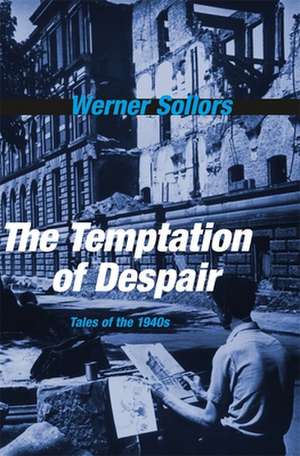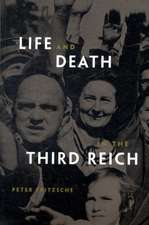The Temptation of Despair – Tales of the 1940s
Autor Werner Sollorsen Limba Engleză Hardback – 8 mai 2014
These tales reveal writers, visual artists, and filmmakers as well as common people struggling to express the sheer magnitude of the human catastrophe they witnessed. Some relied on traditional images of suffering and death, on Biblical scenes of the Flood and the Apocalypse. Others shaped the mangled, nightmarish landscape through abstract or surreal forms of art. Still others turned to irony and black humor to cope with the incongruities around them. Questions about guilt and complicity in a totalitarian country were raised by awareness of the Holocaust, making After
Dachau a new epoch in Western history. The Temptation of Despair is a book about coming to terms with the mid-1940s, the contradictory emotions of a defeated people--sorrow and anger, guilt and pride, despondency and resilience--as well as the ambiguities and paradoxes of Allied victory and occupation.
Preț: 289.01 lei
Nou
Puncte Express: 434
Preț estimativ în valută:
55.30€ • 57.89$ • 45.76£
55.30€ • 57.89$ • 45.76£
Carte disponibilă
Livrare economică 15-29 martie
Preluare comenzi: 021 569.72.76
Specificații
ISBN-13: 9780674052437
ISBN-10: 0674052439
Pagini: 400
Ilustrații: 44 halftones
Dimensiuni: 164 x 240 x 32 mm
Greutate: 0.74 kg
Editura: Harvard University Press
ISBN-10: 0674052439
Pagini: 400
Ilustrații: 44 halftones
Dimensiuni: 164 x 240 x 32 mm
Greutate: 0.74 kg
Editura: Harvard University Press
Notă biografică
Descriere
In Germany the end of World War II calls forth images of obliterated cities, hungry refugees, and ghostly monuments to Nazi crimes. Drawing on diaries, photographs, essays, reports, fiction and film, Werner Sollors makes visceral the sorrow and anger, guilt and pride, despondency and resilience of a defeated people--and the paradoxes of occupation.








